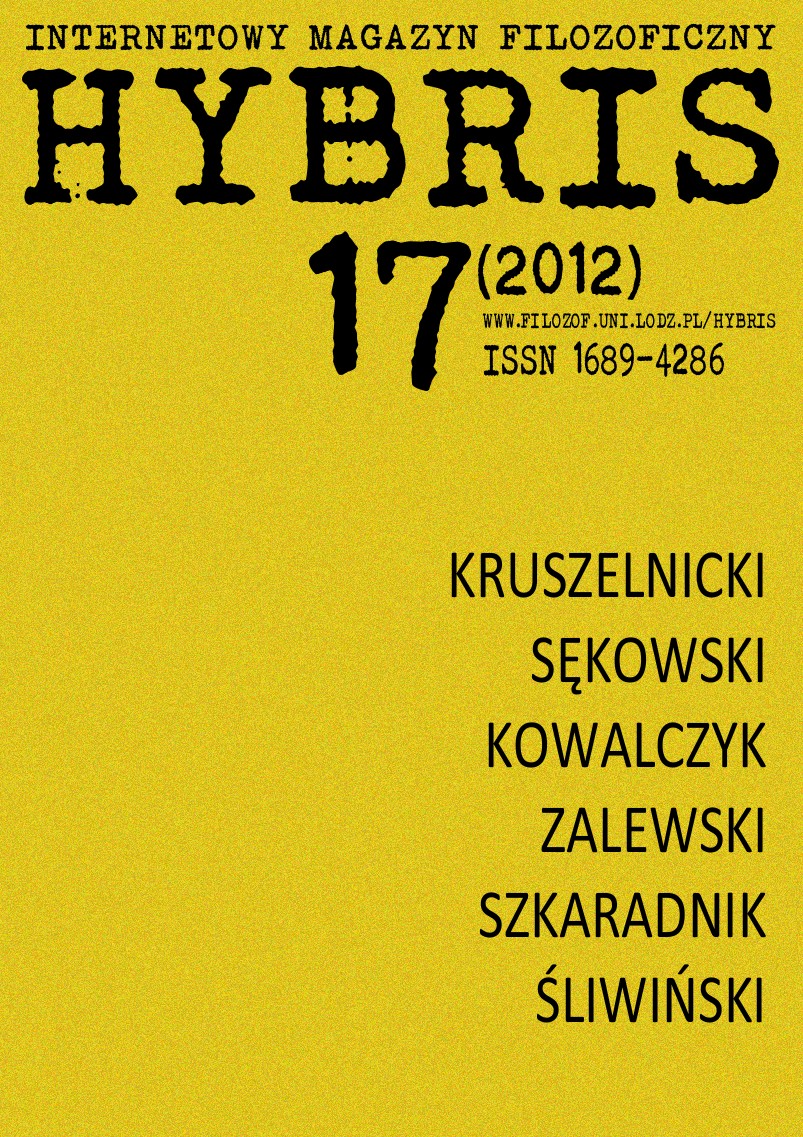Metaphorical Account of Goodness of polis in Plato’s Political Theory
DOI:
https://doi.org/10.18778/1689-4286.17.06Keywords:
(Plato’s) concept of goodness, (Plato’s) concept of justice, Plato’s Republic, Political philosophy, (theory of) metaphor, philosopher-king(s)Abstract
In this article Plato’s views on goodness of state (polis) are investigated. The study involves a reconstruction of three ways in which Plato describes the goodness of state. Firstly, the metaphorical account is analysed on the basis of some examples from Statesman and from Republic. Secondly, the approach to the concept of goodness that is strictly connected to the concept of justice (which is the leitmotiv of Republic) is considered. Lastly, the paper includes the examination of the relation between the concept of goodness and the law on one hand, and the structure of Forms on the other hand. Deliberation on the role of the metaphor (as a conceptual phenomenon), based especially on the juxtaposition of poleis’ political systems and citizens’ characters (eighth book of Republic), leads to the conclusion that there are three ways in which Plato conceives of state, mixed together in the three literary descriptions. Reductionist point of view that can be associated with Santas’s “functional theory of the good” puts emphasis on citizens’ natural needs. Within this standpoint state can be regarded merely as a form of human social life, and the goodness of state is simply a metaphor. From holistic perspective, contrary to the reductionist standpoint, state is treated as a separate, or even living, entity consisting of the citizens as its elements, and having its own interests. This approach gives priority to the goodness of state, which is primal in relation to the goodness of citizen. Probably, the most representative for Plato’s way of thinking is the paradigmatic point of view, which is present in his Theory of Forms. From this angle, state and human soul are isomorphic objects. Therefore they are subjects of the same attributes, connected with virtues (aretai). However, Plato does not explicitly declare which conceptualisation should be regarded as the most adequate. This makes Plato’s political theory incoherent, and may be the reason why it is so controversial.
References
Annas, J. (2010), Virtue and law in Plato, [w:] Ch. Bobonich (red.), Plato’s Laws: A Critical Guide, Cambridge U.P.
View in Google Scholar
Aronson, S.H. (1972), The Happy Philosopher Problem – A Counterexample to Plato’s Proof, [w:] „Journal of the History of Philosophy” 10, 383–98.
View in Google Scholar
DOI: https://doi.org/10.1353/hph.2008.1718
Baracchi, C. (2002), Of Myth, Life, and War in Plato’s Republic, Bloomington: Indiana U.P.
View in Google Scholar
Brickhouse, T.C. (1998), The Paradox of the Philosophers’ Rule, [w:] Smith (red.), Plato: Critical Assessments, Londyn.
View in Google Scholar
Brown, E. (2000), Justice and Compulsion for Plato’s Philosopher-Rulers, [w:] „Ancient
View in Google Scholar
DOI: https://doi.org/10.5840/ancientphil200020111
Philosophy” 20, 1–17.
View in Google Scholar
Devereux, D. (2006), The Unity of the Virtues, [w:] H. H. Benson (red.), A Companion to Plato, Malden/Oxford/Victoria: Blackwell Publishing Ltd.
View in Google Scholar
Jurewicz, O. (2001), Słownik Grecko-Polski, Warszawa: Wydawnictwo Szkolne PWN
View in Google Scholar
Keyt, D. (2006), Plato on Justice, [w:] H. H. Benson (red.), A Companion to Plato, Malden/Oxford/Victoria: Blackwell Publishing Ltd.
View in Google Scholar
Kraut, R. (1991), Return to the Cave: Republic 519–521, [w:] „Proceedings of the Boston Area Colloquium in Ancient Philosophy” 7, 43–62.
View in Google Scholar
DOI: https://doi.org/10.1163/2213441791X00042
Platon (1956), Sofista, Polityk, przeł. W. Witwicki, Warszawa: PWN.
View in Google Scholar
Platon (1960), Prawa, przeł. M. Maykowska, Warszawa: PWN.
View in Google Scholar
Platon (2003), Państwo, przeł. W. Witwicki, Kęty: Wydawnictwo ANTYK.
View in Google Scholar
Purshouse, L. (2006), Plato’s Republic: A Reader’s Guide, London/New York: Continuum.
View in Google Scholar
Reeve, C.D.C. (1988), Philosopher-Kings: The Argument of Plato’s Republic, New Jersey: Princeton U.P.
View in Google Scholar
Santas, G. (1985), Two theories of good in Plato’s Republic, [w:] „Archiv für Geschichte der Philosophie” 67, 223–45.
View in Google Scholar
DOI: https://doi.org/10.1515/agph.1985.67.3.223
Santas, G. (2001), Goodness and Justice: Plato, Aristotle, and the Moderns, Oxford: Blackwell.
View in Google Scholar
Sidgwick, H. (1907), The Methods of Ethics, London: Macmillan.
View in Google Scholar
Smith, N. D. (2010), Return to the Cave, [w:] M. L. McPherran (red.), Plato’s Republic: A Critical Guide, Cambridge U.P.
View in Google Scholar
White, N. (2006), Plato’s Concept of Goodness, [w:] H. H. Benson (red.), A Companion to Plato, Malden/Oxford/Victoria: Blackwell Publishing Ltd.
View in Google Scholar
Downloads
Published
How to Cite
Issue
Section
License

This work is licensed under a Creative Commons Attribution-NonCommercial-NoDerivatives 4.0 International License.






